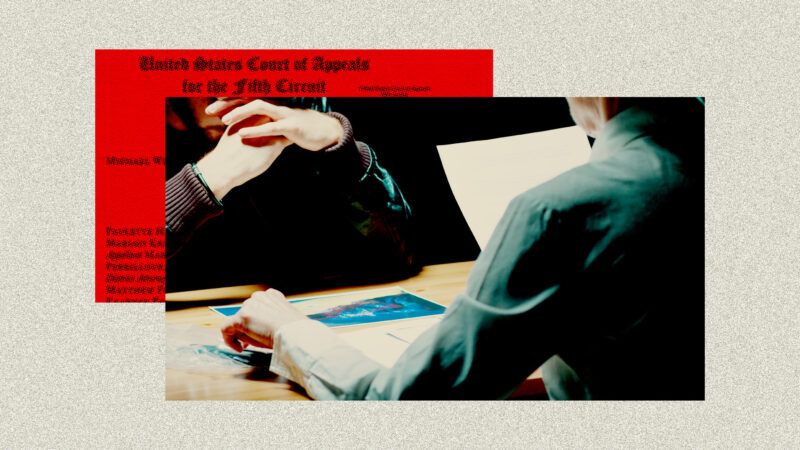He Was Sentenced to Death After Law Enforcement Fabricated Evidence. A Federal Court Says He Can Sue.
A conservative judge expressed skepticism at the panel's conclusion before issuing a strong rebuke of prosecutorial immunity.

In 2001, a prosecutor and a police officer zeroed in on a child who they claimed could shed some much-needed light on a yearslong Louisiana murder investigation. But in reality, the law enforcement agents had pinpointed a suspect of choice, constructed a story around him, and then coerced a juvenile witness into adopting that story.
The next year, the man at the center of the investigation—Michael Wearry—was convicted of and sentenced to death for the 1998 murder of Eric Walber, after Livingston Parish District Attorney Scott Perrilloux and Sheriff's Detective Marlon Foster strong-armed Jeffrey Ashton, a young teenager facing his own separate charges, to implicate him. They allegedly fed Ashton a tale putting Wearry at the crime scene. They lied about the results of a photo line-up, indicating Ashton had selected Wearry as the culprit when he expressly picked other people. And they hid instances where Ashton departed from the agents' chosen story. All of this despite the fact that Ashton was at a strawberry festival the night of the crime, and that he maintained he'd never seen Wearry prior to Perrilloux and Foster introducing him to his picture.
Wearry's conviction was overturned in 2016. He will be permitted to sue the government agents who fabricated evidence to put him behind bars, a federal court ruled last week.
"Nothing in the story the defendants invented was based on information the child had provided to the Detective or the District Attorney," writes Judge James L. Dennis of the U.S. Court of Appeals for the 5th Circuit. "Foster and Perrilloux detained and coerced Ashton into falsely testifying to a narrative that had no basis in any evidence gathered in the case, physical or testimonial."
At question was whether the two men would be entitled to absolute prosecutorial immunity, which, true to its name, essentially makes it impossible to hold prosecutors accountable when they violate your rights while advocating for the state.
But the majority declined to award that here. The alleged misbehavior on the part of D.A. Perrilloux was investigatory, not advocatory, they said. As for Foster, the judges pointed out the obvious: He is not a prosecutor and is therefore not entitled to prosecutorial immunity. "Foster argues that since he and Perrilloux are accused of committing the same fabricating acts, any entitlement the prosecutor might have for his actions the detective should have too," adds Dennis. "The Supreme Court has rejected this exact argument."
But what perhaps makes this case most ridiculous—a stratospheric bar to meet—is that it was not at all a guarantee that Wearry's claim would succeed. Indeed, according to some, it may be wrong on the merits.
Such was the argument put forth by Judge James C. Ho in a dubitante opinion—one which disagrees with the majority's legal reasoning but, in some sense, stops short of rebuking its conclusion. In Ho's view, there's some reason to celebrate.
But not because the law was applied accurately. The problem is the law is utterly rotten, constructed of a slew of immunity doctrines that give special protections to the government by the government, all while prohibiting victims—whether of a prosecutor, a police officer, a prison guard, a judge, a legislator, a public educator—from achieving any sort of recourse.
"Worthy civil rights claims are often never brought to trial. That's because an unholy trinity of legal doctrines—qualified immunity, absolute prosecutorial immunity, and Monell v. Department of Social Services of City of New York, 436 U.S. 658 (1978)—frequently conspires to turn winnable claims into losing ones," he writes. "This case illustrates that conspiracy in action."
The conspiracy, he says, is that Wearry should not, in fact, be able to bring his suit forward. Yet that's not because it ought to be that way. It's because, according to Ho's interpretation of absolute-immunity precedent, it is that way. Unfortunately so.
"The majority says it is 'strange' to apply prosecutorial immunity here. I agree," says Ho. "But a faithful reading of precedent requires us to grant it here, no matter how troubling I might personally find it."
Ho's rebuke of the immunity doctrines—legislated into existence by the Supreme Court—is somewhat of an about-face for him. In 2019, he wrote that qualified immunity is necessary to "stop mass shootings." The legal doctrine protects state and local actors, notably police, from facing similar federal civil suits if there is no prior court case on the books explicitly ruling the alleged misconduct unconstitutional. In plainer terms, it's how previous officers have been able to avoid their day in court for stealing hundreds of thousands of dollars, blowing up an innocent person's property, shooting children, and assaulting someone before filing bogus charges. No preexisting court precedents had enough factually similar details, so the victims could not proceed.
Contrast that with Ho's most recent characterization of qualified immunity: "It requires civil rights plaintiffs to prove not only a violation of their constitutional rights, but a 'clearly established' one," he notes in his dubitante opinion. "But the 'clearly established' requirement lacks any basis in either the text or original understanding of" civil rights law.
Ho posits a remedy, and it has nothing to do with him. "Congress decides what our laws shall be," he writes. "Congress can abolish qualified immunity, absolute prosecutorial immunity, and Monell. And it can do so anytime it wants to."
He is correct. It recently had multiple chances to do so. And despite record consensus around an issue that used to be beyond obscure, Congress did what Congress does: Nothing.


Show Comments (30)